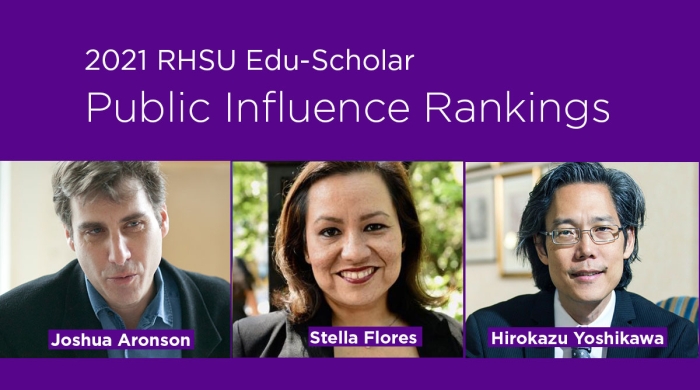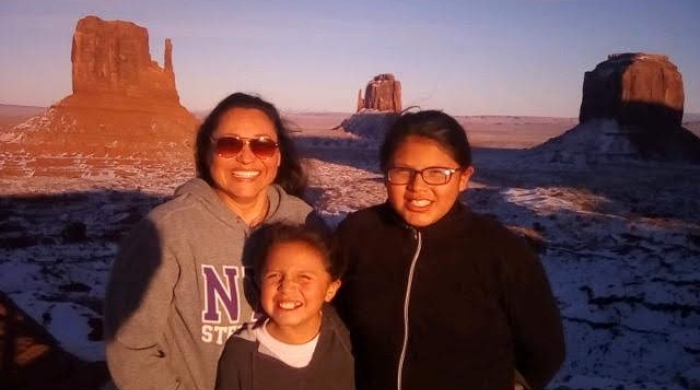As the new Major League Baseball season approaches, fans hope that “The Mets Way,” a strategy devised by an educational sociologist, will usher in a long-awaited, winning era in Flushing Meadow Park.
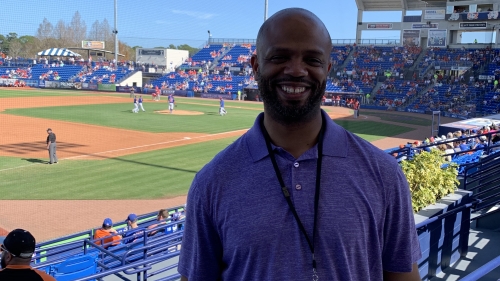
Lewis-McCoy at Mets Spring Training in Port St. Lucie, Florida
L'Heureux Lewis-McCoy, an associate professor at NYU Steinhardt, teaches his sociology of education students about the education system in this country, with a particular focus on K-12 and diverse suburban education. He teaches and researches about the connections between the places that people come from, what happens in schools (learning), and what can be done to make sure that all learners are engaged.
Lewis-McCoy has taken his teaching expertise to Flushing to help the New York Mets, a team with only two World Series titles to their name, recapture the magic they once had. In 1969, they became known as the Miracle Mets when the newly formed team that included legends like Tom Seaver, Bud Harrelson, and Tug McGraw, upset the Baltimore Orioles, the best team in baseball, with 109 wins.
While they’ve had some success since--including a World Series win in 1986 and two other World Series appearances led by legendary players like Mookie Wilson and Mike Piazza--they haven’t won a championship in over 30 years.
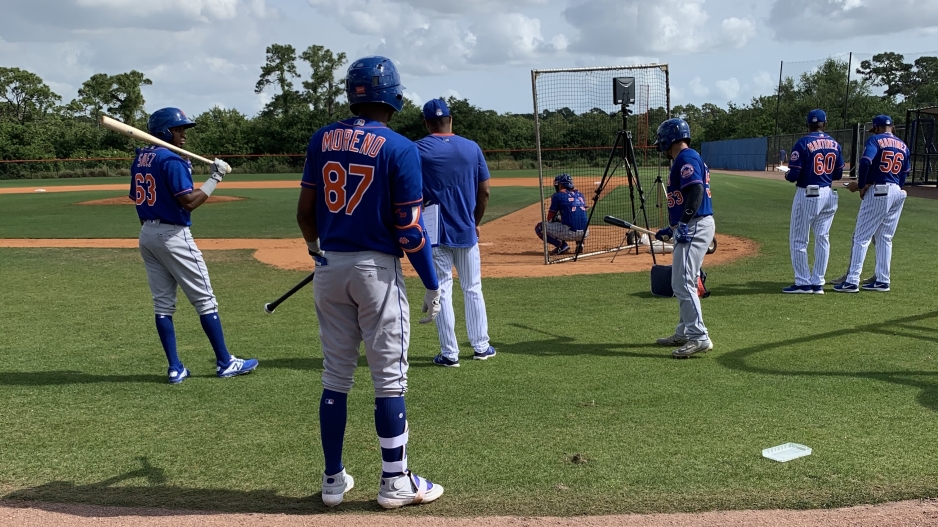
Players prepare for batting practice
The Mets Way is a new philosophy. It’s a plan for success that aims to help coaches to connect with players and by teaching them the socio-dynamic metrics of baseball beyond the game itself.
Many of the lessons and tools that Lewis-McCoy is bringing to the Mets are an extension of his research on diverse learners, particularly Black and Latinx students. The goal of his research is to make sure that the materials he presents have application to their lives, paying particularly close attention to age, gender, race, class, ability status and other dimensions of culture.
“In many ways, my work with the Mets brings together many different threads of my work with teachers, students, and community members,” says Lewis-McCoy.
In many ways, my work with the Mets brings together many different threads of my work with teachers, students, and community members."
Other Major League Baseball teams have a philosophy based on a standard of excellence that provides a foundation for success. The Mets have never had that foundation on which to build. “‘The Mets Way’ is an attempt to establish a culture that cuts across from players, to front office, all the way down to the folks who carry the equipment,” says Lewis-McCoy.
“I’m working with them to import teaching and the lessons around how to deal with differences in diversity, age, learning type, and generation to the environment of baseball.”
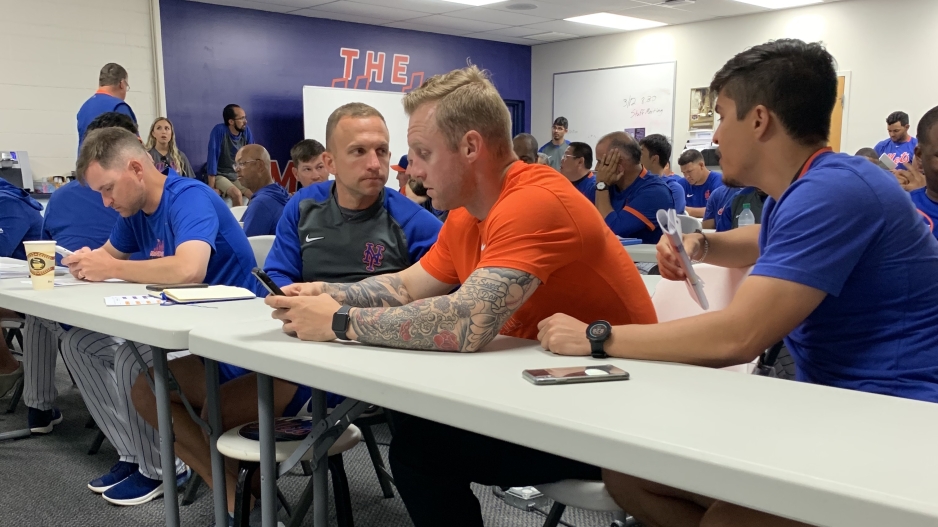
Coaches await the start of a workshop with L'Heureux Lewis-McCoy
Allard Baird, assistant general manager for scouting and player development, and others in the organization have looked at what Mets baseball is, and who the Mets want to be, according to Lewis-McCoy. “They’ve said we have talented people and an investment in the team, but it's time to invest in a collective culture.”
Lewis-McCoy’s work is not about tweaking Pete Alonso’s fielding skills or batting stance, but providing the coaches with skills to better instruct the player.
“I’m not here to tell folks how to hit, I’m here to help the coaches understand how to deliver the instruction around hitting,” says Lewis-McCoy. “The connective tissue matters when they’re creating meaningful relationships with their players. Strengthening these relationships is as important as the content that they’re delivering.”
I’m not here to tell folks how to hit, I’m here to help the coaches understand how to deliver the instruction around hitting."
A lifelong Mets fan himself, Lewis-McCoy works primarily with their coaching and strength and conditioning staff to help them understand what collaborative coaching might look like. He’s using lessons that he learned from his research in schools on how educators can connect to and leverage learners’ backgrounds to create more dynamic and fertile learning environments.
Lewis-McCoy sees his work with the Mets as a larger application of his classroom teaching.
“We are becoming more dynamic as educators and incorporating a diversity of teaching techniques to reach a range of learners,” he says. “Students learn differently, and so do baseball players.”
Part of Lewis-McCoy’s work is to address the generational divide that exists between the front office, the coaching staff, and the players.
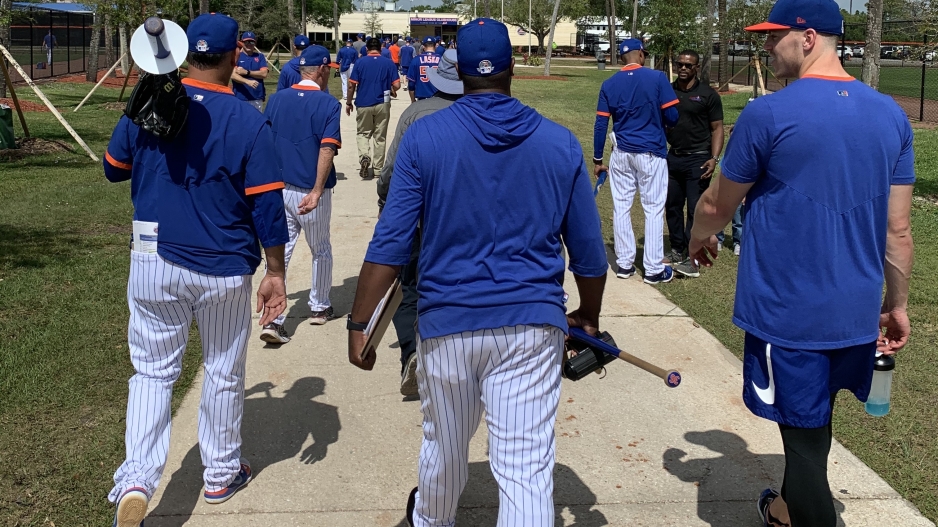
Players heading back to the clubhouse after a day of spring training
“We’ve been doing a lot of work on how people think about and receive information and then helping coaches understand that, ‘Hey, the way you were taught may have worked then, but these are new players from a different generation and there are some new ways to teach and make connections that will help us see improvement.’“
To help them conceptualize this task, Lewis-McCoy created a worksheet, rubric for assessment, and heuristic device for coaches and staff designed to help the front office identify ways that coaches can connect with the players. It provides checkpoints for coaches to consider along the way.
“I connected their ideas with what we know about pedagogy, culture and generational status,” says Lewis-McCoy.
Lewis-McCoy has also been working with the team on collaborative coaching.
“Collaborative coaching comes out of my research on collaborative teaching. In baseball, collaborative coaching means coaches work together to understand the unique sets of needs of adult learners. It’s about recognizing culture, ability, and finding solutions. A lot of it is getting them to reframe their approach. What I do is present them with five tools and instructions on how to make sure they’re using them on a consistent basis.”
What are those tools, exactly?
Well, for now, they’re a secret.
* * *
At the time of publication, the MLB owners and the players’ union are trying to work out a deal that could lead to a COVID-19-modified season. Many obstacles related to revenue sharing still remain, as well identifying cities that have been cleared to host sporting events.
Related Articles
Three NYU Steinhardt Professors Ranked as Most Influential Policy Scholars in the Nation
Hirokazu Yoshikawa, Joshua Aronson, and Stella Flores are among the most influential policy academics in the country according to the 2021 RHSU Edu-Scholar Public Influence rankings.
Expanding Opportunity for the Rosebud Sioux Tribe: An Interview with RoseMary Clairmont, Online EdD Student
In Indian education, there is work being done, and RoseMary Clairmont, online EdD student, is invested in doing it.

